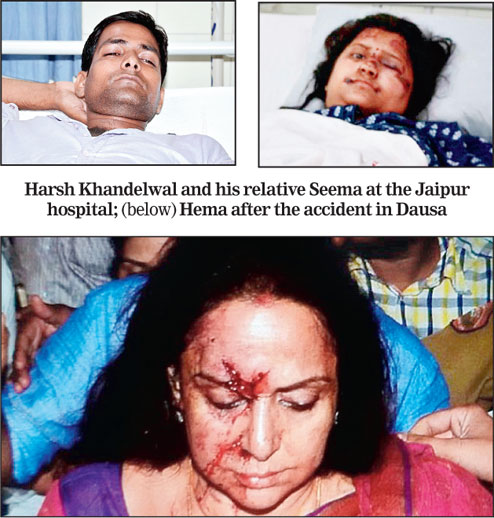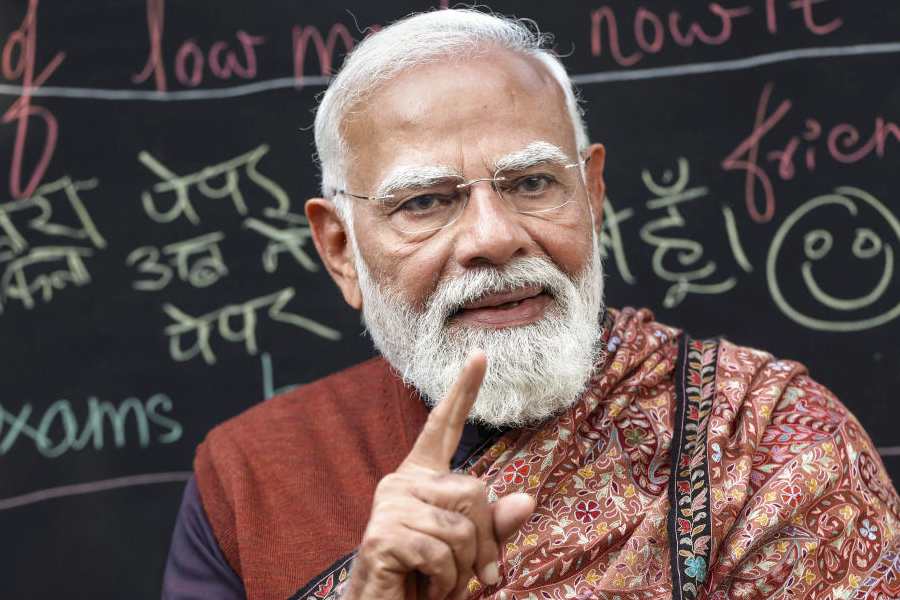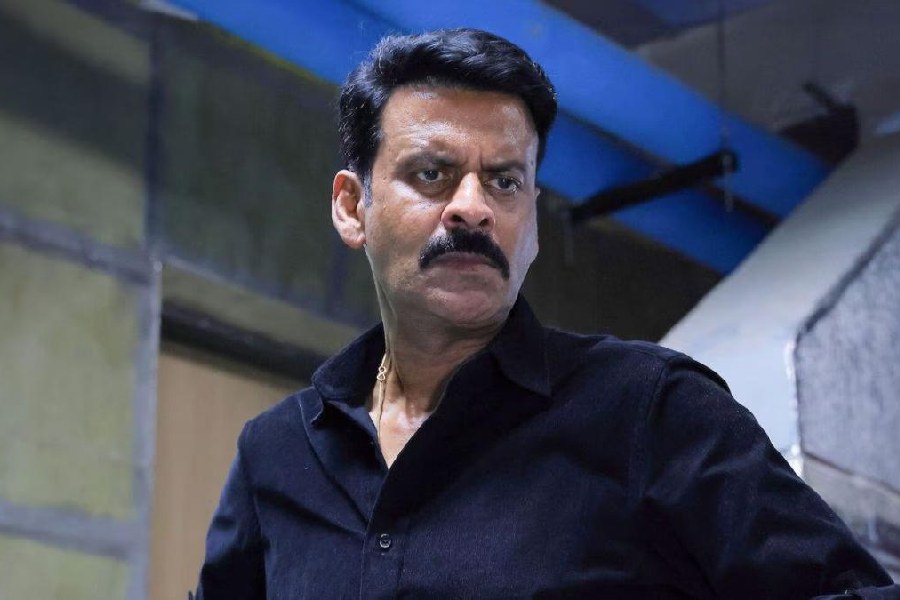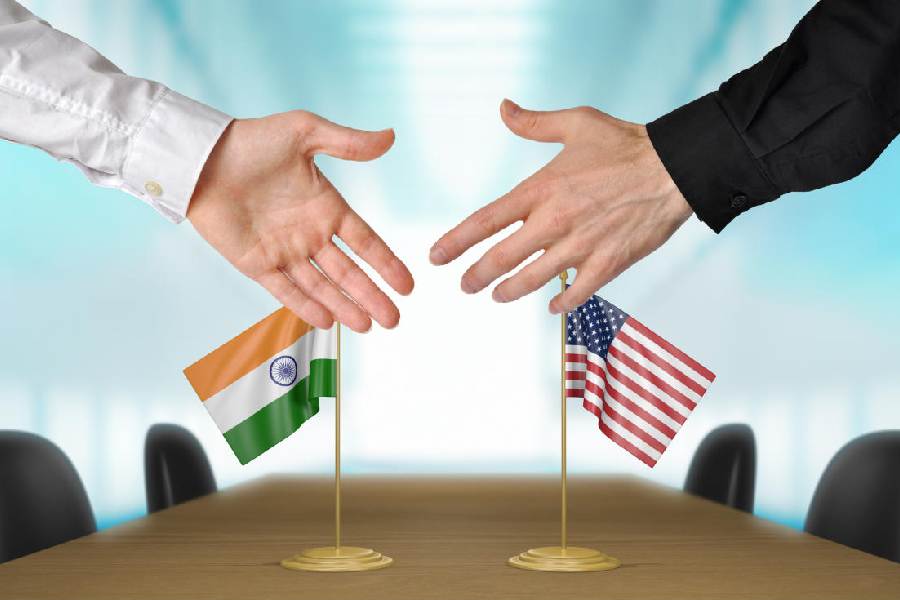
New Delhi, Jan. 3: The government tonight signalled it was re-evaluating the sequencing of peace talks with Pakistan after twin terror strikes in Pathankot and Afghanistan left it battling criticism of Prime Minister Narendra Modi's recent overtures to Islamabad.
The "rethink" arose from a late evening meeting between Modi, national security adviser Ajit Doval and foreign secretary S. Jaishankar that lasted close to an hour. Around the same time, reports emerged about bomb explosions near the Indian consulate in the Afghan city of Mazar-e-Sharif.
The "comprehensive dialogue" with Pakistan, announced by foreign minister Sushma Swaraj when she visited Islamabad last month, remains untouched for the moment, two officials told The Telegraph.
But Modi has asked Jaishankar and Doval to explore whether the foreign secretary's scheduled January 15 visit to Islamabad should be deferred by a few days and preceded by a meeting of the national security advisers to specifically discuss the Pathankot and Afghanistan attacks.
No decision has been taken yet on postponing Jaishankar's visit, the officials added. But they conceded the growing pressure the government faced over its Pakistan policy, which has witnessed serial flip-flops during Modi's 19 months in power.
That pressure earlier in the day saw Sushma attempt for the first time to weld a broad strategic consensus on the government's approach to Pakistan through consultations with veteran diplomats.
She hurriedly called a meeting with six former high commissioners to Pakistan and an ex-foreign secretary. Accompanied by her deputy V.K. Singh and Jaishankar, she told the ex-envoys that for the moment, the government was keen to avoid calling off key talks scheduled this month, two diplomats present at the meeting said.
Jaishankar's Islamabad trip, where he is to meet his counterpart Aizaz Ahmed Chaudhry, is aimed at drawing up a road map for a range of parallel negotiations under the "comprehensive dialogue".
But Sushma also told the diplomats that she wanted their "collective wisdom", offering the first glimpse of the pressure the administration was under after serial about-turns on Islamabad.

Those about-turns have been accompanied by an absence of clarity that has left even supporters of dialogue with Pakistan within the strategic community, including many of the diplomats Sushma met today, searching for some consistency.
"What we really need with the Pakistan policy of this government is some continuity, some consistency," foreign policy analyst and JNU international relations professor Happymon Jacob had told this newspaper in a recent interview. "I say that even as I welcome the move towards a thaw."
The former diplomats who met Sushma represent the who's who of India's brains trust on Pakistan for over two decades.
Sushma sat at the head of an oval-shaped table between Singh and Jaishankar. Next to Singh sat Satinder Lambah, high commissioner to Pakistan from 1992 to 1995 (including the period of the Bombay blasts) and former Prime Minister Manmohan Singh's special envoy for talks with Islamabad.
Next was former foreign secretary Shyam Saran. Beside him sat T.C.A. Raghavan, high commissioner to Pakistan till December 31.

Palakkad where relatives showed up after getting news of his death. (PTI)
Opposite Lambah and next to Jaishankar sat G. Parthasarathy, high commissioner during the Kargil War. There was Shivshankar Menon, foreign secretary during the 2008 Mumbai attacks and later the national security adviser who was also high commissioner to Pakistan from 2003 to 2006.
Next sat Sharat Sabharwal, high commissioner in Islamabad from 2009 to 2013, and Satyabrata Pal, high commissioner during the 2008 Mumbai attacks. The Modi government had not called these veteran diplomats together for such consultations on Pakistan till now.
Modi has met his Pakistani counterpart Nawaz Sharif twice within a month, the latest during his surprise Christmas visit to Lahore. Sushma had travelled to Islamabad on December 9 to announce the resumption of broad-based talks on all disputes. Doval met his counterpart, Nasser Khan Janjua, in Bangkok on December 6.
The government, officials said, is intensely aware of the political risks from the images of Modi and Sharif walking hand in hand at Lahore airport if the Pathankot attack gets entrenched in the public mind as a Pakistan-sponsored strike.
Modi's predecessors Atal Bihari Vajpayee and Manmohan Singh too had faced intense political pressure when they tried to pursue peace talks amid terror attacks. Modi faces the further allegation of turning back on his own words - he had been unsparing in accusing Manmohan of being "soft on terror".
Modi had repeatedly said during the general election campaign that talks with Pakistan could not proceed in the backdrop of gunshots and explosions - the exact situation today.
Broad support from the former diplomats can help the government justify pursuing peace talks despite Modi's earlier comments.
Political sources in the BJP said Modi was keen not to let the attacks derail the peace process, which appeared to have the Sangh leadership's support for now.
Most of the diplomats today cautioned against cancelling the mid-January talks. Instead, they suggested, Jaishankar should during his visit share any evidence of Pakistani links to the Pathankot attack.
Sushma told them the government had intelligence suggesting the terrorists may have come from Bahawalpur in Pakistan's Punjab and may have links with the Jaish-e-Mohammed terror group, known to have had support from sections within the Pakistani army.
"The mistake we have sometimes made in the past is to equate these sections within the Pakistani establishment with the Pakistan government," Pal had told this newspaper on Saturday.
"Yes, there was a time when these sections represented the mainstream in Pakistan. Not any more."










